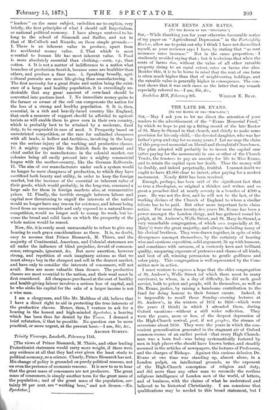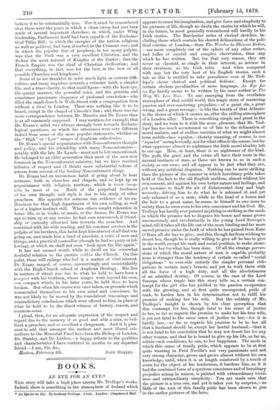THE LATE DR. EVANS.
[TO THE EDITOR OF THE "SPECTATOR:']
SIR,—May I ask you to let me direct the attention of your readers to the advertisement of the Evans Memorial Fund," by which we hope to put up a fitting record of the late Rector of St. Mary-le-Strand in that church, and chiefly to make some provision for his only child,—the devoted daughter, who was her father's prop and stay for so many years.? Let me urge the claim of this proposed memorial on liberal and thoughtful Churchmen. The plan adopted will probably be to invest the capital sum (after paying for the monument) in one or other of the Church Trusts, the trustees to pay an annuity for life to Miss Evans, and to retain the capital upon her death. Thus the money will be doubly, and indeed perpetually, fruitful. I cannot doubt we ought to have £1,000 clear to invest, after paying for a modest monument. Nearly £600 has been received.
Enough, perhaps, has been said of the significant fact that so true a theologian, so original a thinker and writer, and so great a preacher died at nearly seventy in a benefice of £300 a year. He was not the first, and he will not be the last, of the working divines of the Church of England to whom a similar tribute has to be paid. But other more important facts claim notice. For more than twenty-five years Dr. Evans has been a power amongst the London clergy, and has gathered round his pulpit, at St. Andrew's, Wells Street, and St. Mary-le-Strand, a very remarkable congregation, of which men (especially at St. Mary's) were the great majority, and always including many of his clerical brethren. They were drawn together, in spite of wide divergences amongst themselves, by the certainty of hearing wise and cautious exposition, solid argument, lit up with humour, and sometimes with sarcasm, of a curiously keen and brilliant quality, unsparing exposure of pretences and shams of all kinds, and best of all, winning persuasion to gentle godliness and sober piety. This congregation is well represented by the Com- mittee now in action.
I must venture to express a hope that the older congregation of St. Andrew's, Wells Street (of which there must be many survivors), to whom, in a day of difficulty, he did such good service, both to priest and people, will do themselves, as well as Dr. Evans, justice, by raising a handsome contribution to the fund for doing honour to their former curate. Indeed, it is impossible to recall those Sunday - evening lectures at St. Andrew's, in the winters of 1851 to 1856—which were the years (I think) in which I attended them, during Oxford vacations—without a still wider reflection. They were the years, more or less, of the deepest depression of the High-Church revival, post, if not propter, the stream of secessions about 1850. They were the years in which the con- venient generalisation generated in the stagnant air of Oxford common-rooms of an earlier period—that every High Church- man was a born fool—was being systematically fostered hy- men in high places who should have known better, and steadily assumed in the articles of newspapers, the lectures of Professors, and the charges of Bishops. Against this curious delusion Dr. Evans at one time was standing up, almost alone, in a London pulpit, on intellectual grounds, as the exponent of the High-Church conception of religion and duty, and did more than any other man to reconcile the restless religious intelligence of London men of the world, of letters, and of business, with the claims of what he understood and believed to be historical Christianity. I am conscious that qualifications may be needed to this broad statement, but I
believe it to be substantially true. For it must be remembered that these were the years in which a clean sweep had just been made of several important churches ; in which, under Whig leadership, Parliament itself had been capable of the Ecclesias- tical Titles Bill ; in which the energies of the nation, religious as well as political, had been absorbed in the Crimean war ; and in which the popular line of prophecy, in too many pulpits, was that the Turk was a very excellent Christian, and the Sultan the most natural of Knights of the Garter ; that the French Empire was the ideal of Christian civilisation; and that everything, in fact, was for the best, in the best of all possible Churches and kingdoms !
Some of us are thankful to refer much light on current diffi- culties, and many impulses towards a robuster faith, a simpler life, and a truer charity, to that small figure—with the keen eye, the quaint manner, the powerful voice, and the genuine and sometimes passionate eloquence of profound conviction—who filled the small church in Wells Street with a congregation then without a rival in London. There was nothing like it to be heard, except in the chapel of Lincoln's Inn ; and there was far more correspondence between Mr. Maurice and Dr. Evans than is at all commonly supposed. I may mention, for example, that Dr. Evans's mind was always strongly bent towards Eschato- logical questions, on which his utterances were very different indeed from some of the more popular statements, whether on the " High " or "Low" ranges of Anglican orthodoxies.
Dr. Evans's special acquaintance with Nonconformist thought and policy, and his friendship with many Nonconformists— notably with the late Mr. Lynch—must not be left unmentioned. He belonged to an older generation than most of the men now foremost in the Nonconformist ministry, but we have received tributes of respect and (I think) more substantial tokens of esteem from several of the leading Nonconformist clergy.
Dr. Evans had an uncommon habit of going about to hear sermons, both in churches and chapels, and so kept up an acquaintance with religious territory, which is terra incog- nita to most of us. Much of the perpetual freshness of his own thought and style is due to his study of other preachers. His appetite for sermons was evidence of his en- thusiasm for that high department of his own calling, as well as of a higher instinct still. When others sought relaxation in home life, or in books, or music, or the drama, Dr. Evans was apt to turn up at any service he had seen announced, if friend- ship or curiosity attracted him towards the preacher. And combined with his wide reading, and his constant services in the pulpits of his brethren, this habit kept him abreast of all that was going on, and made him a fund of anecdote, a critic of men and things, and a practical counsellor (though he had no party or fol- lowing), of which we shall not soon " look upon the like again."
It has not seemed worth while to dwell on his somewhat doubtful relation to the parties within the Church. On this point, those will enlarge who feel it a matter of vital interest. Dr. Evans ranged, of course, unswervingly and unmistakably with the High-Church school of Anglican theology. His line in matters of ritual was due to what he held to have been a compact with his brethren, whose usages went beyond his own, —a compact which, in his later years, he held them to have broken. But when his course was once taken, on grounds which commended themselves to his own mind and conscience, he was not likely to be moved by the roundabout reasonings and contradictory conclusions which were offered to him, in place of what he held to be the direct witness of history, reason, and common-sense.
I plead, then, for an adequate expression of the respect and regard due to the memory of so good and able a man, so bril- liant a preacher, and so excellent a clergyman. And it is plea- sant to add that amongst the earliest and most liberal sub- scribers to the Memorial Fund have been the Bishop of London, Dr. Stanley, and Dr. Liddon,—a happy tribute to the qualities and characteristics I have ventured to ascribe to my departed friend.—I am, Sir, &c.,



































 Previous page
Previous page